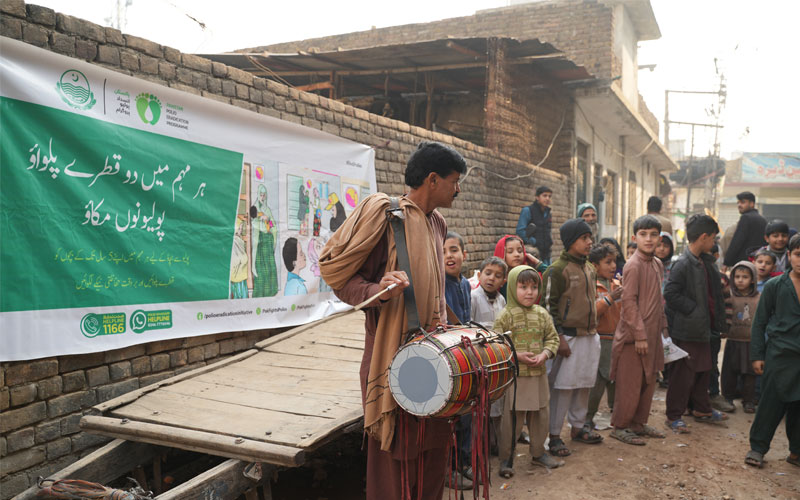Wasif Mehmood, Communication Officer
LAHORE: The sound of drums is enough to rouse even the sun; prompting it to wrestle the smog for a front-row seat in this Rawalpindi neighborhood.
It is not long before the local Pashtun community also catch the beat. From the tea stall owners who have just set up shop for the day. To the women, largely restricted used to working only inside the home, who stick their heads out of windows, craning their necks to see what is going on. While children, rushing out of their houses, flock around the mysterious drummer. And as he moves from street to street, they run alongside him. Flushed with excitement, they start dancing to the familiar local tunes, some of them falling over each other. All smiling. It proves a welcome distraction on a cold January morning.

But none of this happened by chance. For there is a banner draped around the drummer, reading: “Let’s vaccinate children regularly to eradicate polio. The latest drive begins on January 8. Help us vaccinate your children whenever a health team visits your house.”
This attention-grabbing approach harnesses local cultural traditions to reach out to parents and is the brainchild of UNICEF’s Social Behavior Change unit in Punjab. At the helm is Ms Sajida Mansoor. She believes that an information overload on anti-polio immunization has led to parents and caregivers feeling overwhelmed to the point of inaction.
“Out-of-the-box thinking was required to respond to the challenge of missed children. That’s how we came up with the fun idea of using drums to spread awareness and promote key immunization dates as part of the national polio drive.”
The drummer pauses to allow the call for prayers to be heard. But the show isn’t over. Taking center-stage next is seven-year-old Gul Bahisht, armed with a book. She reads: “Pakistan is very close to polio eradication. [But still] the polio virus is spreading in our area which can paralyze children. [So] always vaccinate your children and save them from the darkness of paralysis and deprivation. I have been vaccinated. Have your children been vaccinated also? Let’s do everything to eradicate polio. Two drops for every child in every campaign. Polio-free Pakistan. Long live Pakistan.”
The drummer picks up where he left off and the festivities resume, much to the delight of the children.
The strategy has struck a chord with local communities who proved more receptive when polio teams next visited. In Union Council 5, where this scheme was first piloted, along with some additional areas of Rawalpindi and Lahore, teams reported that parents no longer “took ages to open doors” thereby risking leaving behind a large number of children who were “not available”.
Children, for their part, were happy to see polio teams and showed no distrust, resulting in more efficient vaccination coverage. These positives also highlight the need to expand the initiative in upcoming campaigns to increase immunization in targeted communities.
“It has helped polio teams break barriers with caregivers and they were able to communicate with them more openly during the immunization campaign. And we also made it absolutely clear to the local communication staff to ensure that religious and cultural norms are adhered to. Such as the drummer putting his beats on pause during calls for prayer. Also, the music needs to be culturally sensitive in accordance with the norms of the priority community culture”, Ms Mansoor empathized.
The national immunization drive wrapped on January 14, 2024, with Punjab achieving 96 percent coverage. In union councils of Lahore and Rawalpindi where the strategy was launched, polio teams managed to vaccinate every single available child.
On a provincial scale, Punjab has not reported any polio cases since October 2020. However, 11 environmental samples collected from Lahore, Rawalpindi and Multan tested positive in 2023. The positivity rate of polio environmental samples stood at 2.9 per cent in 2023 as compared to 4 per cent in 2022, down by more than 1 per cent. Ten samples were linked to the virus cluster YB3A which is active in Afghanistan. The risk of importation has led Punjab to take concrete steps to improve quality of campaigns by adopting new communication methods.
